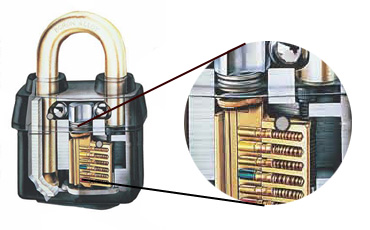Any padlock can be picked but some more easily than others. At the top end, they are near impossible for even the most experienced lock-smiths to pick and even then, it could take hours.
Within a padlock are spring-loaded pins of different lengths. These are pushed up when the key is placed into the lock barrel. The notches on the key cause the pins to be aligned and the barrel to rotate. Using specialised lock picks it is possible to manipulate almost every padlock to open.
Due to their size, smaller padlocks contain fewer pins which inevitably make them easier to align and therefore pick. A 30mm padlock, for example, would contain about 3-4 pins. However, a 50mm padlock could contain 4-7 pins.

Premium padlock manufacturers have now developed various anti-manipulation mechanisms which include guarded keyways, split pins, pins with mushroom shaped heads and locking mechanisms without any pins at all. As a rule, if you purchase a high quality padlock of a reasonable size you can rest assured that it will be secure against even experienced thieves and lock-pickers.
However, when securing especially valuable items you may want a padlock that is impossible to pick. As an example, the manufacturers ABUS and Abloy have developed cylinders for their padlocks which use rotating disks rather than pins. ABUS Padlocks which use this system are known as their Granit Plus range. Since the discs can be rotated 360 degrees it makes it near impossible to be compromised and the key can only be copied by an authorised lock-smith using a unique code card provided within the padlock.